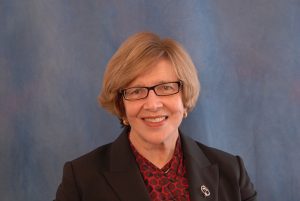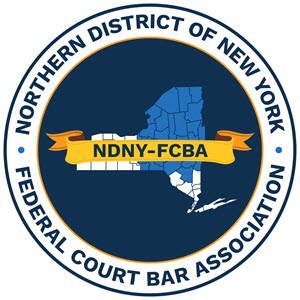On May 17, 2024, the United States Court of Appeals for the Second Circuit convened a Ceremonial Session to honor the late Honorable Rosemary S. Pooler, United States Circuit Judge. Judge Pooler passed away on August 10, 2023, leaving us with a remarkable and far-reaching legacy.
 While she was born and raised in Brooklyn, New York, she made her home in Syracuse following her graduation from University of Michigan Law School in 1965. After several years in private practice, Judge Pooler served as Assistant Corporation Counsel/Director of the Consumer Affairs Unit for the City of Syracuse from 1972 to 1973. From 1974 to 1975, Judge Pooler was a District Representative on the Common Council of the City of Syracuse. From 1975 until 1980 she was Chair and Executive Director of the Consumer Protection Board of the State of New York. She served as a member of the New York State Public Service Commission from 1981 until 1986. In 1987, Judge Pooler was Staff Director of the Committee on Corporations, Authorities and Commissions of the New York State Assembly. She was Visiting Professor of Law at Syracuse University from 1987 until 1988 and was Vice-President for Legal Affairs of the Atlantic States Legal Foundation from 1989 until 1990. In 1990, she became the first woman to be elected a Justice of the Supreme Court, Fifth Judicial District, State of New York, and served in this position until becoming the first woman to be appointed as a United States District Judge for the Northern District of New York in 1994. Judge Pooler was appointed to the Second Circuit in 1998, where she authored 403 Second Circuit opinions.
While she was born and raised in Brooklyn, New York, she made her home in Syracuse following her graduation from University of Michigan Law School in 1965. After several years in private practice, Judge Pooler served as Assistant Corporation Counsel/Director of the Consumer Affairs Unit for the City of Syracuse from 1972 to 1973. From 1974 to 1975, Judge Pooler was a District Representative on the Common Council of the City of Syracuse. From 1975 until 1980 she was Chair and Executive Director of the Consumer Protection Board of the State of New York. She served as a member of the New York State Public Service Commission from 1981 until 1986. In 1987, Judge Pooler was Staff Director of the Committee on Corporations, Authorities and Commissions of the New York State Assembly. She was Visiting Professor of Law at Syracuse University from 1987 until 1988 and was Vice-President for Legal Affairs of the Atlantic States Legal Foundation from 1989 until 1990. In 1990, she became the first woman to be elected a Justice of the Supreme Court, Fifth Judicial District, State of New York, and served in this position until becoming the first woman to be appointed as a United States District Judge for the Northern District of New York in 1994. Judge Pooler was appointed to the Second Circuit in 1998, where she authored 403 Second Circuit opinions.
Her remarkable life was feted, before an en banc gathering of the judges of the Circuit Court, and family and friends, by Debra Ann Livingston, Chief Judge of the United States Court of Appeals for the Second Circuit, Sonia Sotomayor, Associate Justice of the Supreme Court of the United States, Dennis Jacobs, Circuit Judge of the United States Court of Appeals for the Second Circuit, Lillian Abbott Pfohl, former career law clerk to Judge Pooler, Penelope Pooler Eisenbies, Professor of Finance Practice at Syracuse University Whitman School of Management (one of Judge Pooler’s children), and Brenda K. Sannes, Chief Judge of the United States District Court for the Northern District of New York. Chief Judge Sannes’s remarks follow below.
Remarks by Chief United States District Judge Brenda K. Sannes at the
May 17, 2024 Ceremonial Session to Honor the
Late Honorable Rosemary S. Pooler
Thank you, Chief Judge Livingston, for giving me an opportunity to speak today.
I had the unique privilege of knowing Judge Pooler when she was a trial judge, and I appeared before her as a prosecutor; when she was a circuit court judge, and I appeared before her as an appellate advocate; and when I became a district court judge, and she became a mentor and a friend.
In 1994, when Judge Pooler was appointed to the District Court in Syracuse, I must admit there was a little bit of trepidation in the U.S. Attorney’s Office. How would this state court judge, with expertise in consumer protection and regulatory issues, handle our federal criminal cases?
She won us over, almost immediately. Shortly after Judge Pooler took the bench, “the word” in the office was that she was very smart and she followed the law.
She brought joy to her work. By all appearances, she loved being a district court judge. And she had a dry wit that made for some priceless moments.
In 1996, Judge Pooler tried what was then, and I think still now, the largest criminal trial in the Northern District of New York. It was a cocaine case arising out of a wiretap. Eleven defendants went to trial and the trial lasted 11 weeks. I was the lead prosecutor on the case.
Whenever I reminisce with any anyone about that long trial – whether it is defense counsel, my co-counsel, or the court reporter – the one thing that we all remember is how Judge Pooler made us laugh.
During jury selection, one of the defense attorneys started his individual questioning of prospective women on the jury panel by asking whether they preferred to be addressed as “Miss” or “Mrs.” Judge Pooler quickly put an end to this. At sidebar she asked counsel not to ask women about their marital status unless he asked men about theirs. When defense counsel protested that, he just needed to know how to address a juror, Judge Pooler responded: “Try Ms. It comes trippingly off the tongue once you get used to it. Just try it.”
During the trial one of defense attorneys asked Judge Pooler to take judicial notice of the dates of the autumnal and vernal equinoxes, and the winter and summer solstices. He said that he wanted her to take judicial notice of these dates before he questioned a witness who was expected to testify about events that occurred in the winter and summer. Judge Pooler suggested that this “judicial notice” issue could be discussed in chambers or at side bar later, noting that the dates of the equinoxes and solstices don’t “capture the colloquial uses of season descriptions,” and this witness didn’t “necessarily have to be held to the equinoxes as definitional.” Defense counsel, however persisted in his request for a sidebar, and when Judge Pooler ultimately relented she told the parties that attendance at this sidebar was not mandatory: she said: “anyone who wants to learn about the seasons can join us. If they feel they know enough, they don’t have to.”
During the course of that trial we listened to hundreds of wiretap calls that were generally answered “yo.” Judge Pooler found this amusing. Long after the trial was over, when we would bump into Judge Pooler in the Courthouse she would often start a conversation with “yo.”
In another wiretap case Judge Pooler presided over, the jury had asked for a readback of testimony that was laced with the f word. The prim and proper court reporter read each f word. At the next sidebar Judge Pooler asked the attorneys, “do you think we could have asked the court reporter to say the ‘f’ word one more time?”
Judge Pooler broke a lot of barriers. She was one of only 6 women in her law school class at the University of Michigan. She was later the first woman elected to the New York State Supreme Court for the Fifth Judicial District. And in 1994, she was the first woman appointed to the District Court in the Northern District of New York.
She paved the path for me to follow as a district court judge in the Northern District of New York. And she helped to guide the women who followed her to that bench, particularly me, Chief Magistrate Judge Therese Dancks, Chief Bankruptcy Judge Margaret Cangilos Ruiz, and then Chief Bankruptcy Judge Wendy Kinsella. We met regularly for lunch. I cherish the friendship we developed during these lunches.
I was lucky to have more time with Judge Pooler, when I began giving her rides home from the Second Circuit Judicial Conferences. Those three-hour drives flew by without ever a quiet moment in the car.
During our time together Judge Pooler shared a few stories about what it was like to be the first woman in all of these positions. I know it was at times lonely and hard. I think she especially valued her friendships with those of us who followed her.
There are now five federal women judges in the Northern District of New York. I think it is fitting, and that Judge Pooler would have enjoyed knowing, that the five of us together nominated Judge Pooler for an award that is given by the Women’s Bar Association of the State of New York, in memory of Justice Ruth Bader Ginsburg, for a member who embodies the spirit of Justice Ginsburg. On May 31, Judge Pooler will receive the Ruth Bader Ginsburg Memorial Award from the Women’s Bar Association of the State of New York at their annual dinner in Albany.
Judge Pooler was a mentor to me and a cherished friend. May her memory be a blessing.

